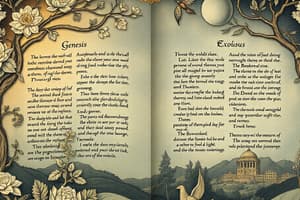Podcast
Questions and Answers
What does the Documentary Hypothesis suggest about the sources of the Torah?
What does the Documentary Hypothesis suggest about the sources of the Torah?
- It includes multiple sources combined over time. (correct)
- It was written solely by Moses.
- It consists of only historical documents.
- It was derived from oral traditions only.
What is the significance of God changing the names of Abraham, Sarah, and Jacob?
What is the significance of God changing the names of Abraham, Sarah, and Jacob?
- It marks the end of their life journeys.
- It shows a failure of trust in God.
- It signifies their new roles and identities. (correct)
- It indicates their divine lineage.
Which of the following was an external sign of the covenant made with Abraham?
Which of the following was an external sign of the covenant made with Abraham?
- The burning bush.
- The rainbow.
- The stone tablets.
- The circumcision. (correct)
What was the first human sin according to Genesis 3?
What was the first human sin according to Genesis 3?
What does Jacob receive as a result of wrestling with the angelic being in Genesis 32?
What does Jacob receive as a result of wrestling with the angelic being in Genesis 32?
What were two main reasons for the transition from the leadership of the Judges to the monarchy?
What were two main reasons for the transition from the leadership of the Judges to the monarchy?
What is the main theological objective of Ezekiel's depiction of the celestial Chariot in Ezekiel 1?
What is the main theological objective of Ezekiel's depiction of the celestial Chariot in Ezekiel 1?
What two examples exemplify the notion of the allegorical sense of Scripture?
What two examples exemplify the notion of the allegorical sense of Scripture?
Study Notes
Identify the Following Terms and Names
- Pentateuch: Another name for the Torah, the first five books of the Hebrew Bible, containing the foundational stories of Judaism and Christianity.
- Documentary Hypothesis: A theory that suggests the Pentateuch was compiled from four distinct sources, each with its own perspective and style:
- J (Yahwist): Emphasizes God's personal involvement, using the name "YHWH" and focusing on human emotions and experiences.
- E (Elohist): Uses the name "Elohim" for God, emphasizing God's transcendence and power.
- P (Priestly): Concentrates on legal and ritual matters, with a focus on the priesthood's role.
- D (Deuteronomic): Promotes the central importance of the covenant between God and Israel, emphasizing social justice and obedience to the law.
- Torah: The first five books of the Hebrew Bible, also known as the Pentateuch, containing the most important stories in Judaism.
- Genesis: The first book of the Bible, focusing on the creation of the world, the fall of humanity, and the origins of the Israelite people.
- Abraham: The patriarch of the Israelites, considered the father of faith and chosen by God to be the ancestor of a great nation.
- Sarah: Abraham's wife, known for her faith and resilience.
- Isaac: Abraham's son, who was almost sacrificed but ultimately spared, symbolizing God's extraordinary mercy and Abraham's unwavering faith.
- Jacob: Abraham's grandson, known for his cunning and resourcefulness, but also for his struggle with God and his transformation into Israel.
- Covenant: An agreement between two parties, in the biblical context, often a binding promise between God and humanity.
- Akedah: The binding of Isaac, a story in Genesis where Abraham is commanded to sacrifice his son, illustrating the depth of his faith and obedience.
- Moses: The prophet who led the Israelites out of slavery in Egypt and received the Ten Commandments from God on Mount Sinai.
- YHWH: The Hebrew name of God, considered sacred and often translated as “Lord.”
- Exodus: The second book of the Bible, narrating the Israelites' liberation from slavery in Egypt, their journey through the wilderness, and the giving of the Law.
- Judges: A period in Israelite history where leaders known as Judges guided the people, often during times of conflict or crisis.
- Monarchy: A form of government where a king or queen rules over a kingdom.
- Ezekiel: A prophet who received a complex vision of a celestial chariot, representing God's power and glory.
Short Essay Questions
- Sources of the Torah:
- The Documentary Hypothesis suggests that the Torah was composed from four distinct sources: J, E, P, and D.
- Each source has a unique perspective, style, and focus.
- J focuses on God's direct involvement and human experiences, E on God's transcendence, P on ritual and laws, and D on obedience to the covenant.
- Comparison of Genesis 1 and Genesis 2:
- Genesis 1 presents a more formal creation account, with God creating the world in six days, culminating with the creation of humanity in God's image.
- Genesis 2 offers a more personal and poetic account, focusing on God's intimate relationship with humanity and creation, including the creation of Adam and Eve and the Garden of Eden.
- Though they present different perspectives, they both offer a profound understanding of God's creative work and humanity's relationship with it.
- First Human Sin and its Consequences:
- The first human sin in Genesis 3 is disobedience, specifically, Adam and Eve's decision to eat from the forbidden Tree of Knowledge of Good and Evil.
- This disobedience leads to a fall from grace, separation from God, and the consequences of death, pain, and struggle in the world.
- Significance of Name Changing:
- In Genesis, God changing people's names signifies a transformation, a shift in their identity, purpose, or destiny.
- Abraham, literally meaning "father of many" reflects his new role as the progenitor of a vast nation. Sarah's name, meaning "princess" signifies her elevated status. Jacob's name, meaning "he deceives," is replaced with Israel, meaning "he who struggles with God," reflecting a shift from cunning to spiritual growth.
- Covenant with Abraham:
- God's covenant with Abraham promises him many descendants, a vast land, and the blessing of being a source of blessing for all nations.
- This covenant establishes the foundation for the Israelite people and their relationship with God.
- Circumcision becomes a visible sign of the covenant, symbolizing the commitment of the Israelites to this covenant and a mark of their identity.
- The Binding of Isaac:
- This harrowing story reveals God's profound commitment to faith and obedience, even when it requires immense sacrifice.
- Abraham's willingness to sacrifice his son demonstrates the depth of his faith and his ultimate trust in God.
- Isaac's passive acceptance shows his faith and understanding of his position as God's instrument.
- Abraham as a Model of Faith:
- Abraham's life exemplifies faith and trust in God, even when faced with uncertainty, doubt, and seemingly impossible commands.
- His life reflects a willingness to follow God’s guidance, demonstrating a deep commitment to his covenant and the promise of a future for his descendants.
- Jacob's Tricks and Consequences:
- Jacob, seeking to gain his father’s blessing instead of waiting for the rightful inheritance, uses cunning and trickery to deceive his brother Esau and father Isaac.
- However, Jacob's own cunning leads to his being deceived in his later life, specifically by Laban, who works him for years without paying a proper wage.
- Obstacles to the Fulfillment of God's Promise:
- In the patriarchal stories, the main obstacles to God's promise of many descendants are often related to:
- Infertility: Both Sarah and Rebekah, wives of the patriarchs, are barren, leading to challenges in fulfilling God's promise.
- Personal Flaw: Individuals, like Jacob, create issues with their own actions and desires, especially when they deviate from God's plan.
- In the patriarchal stories, the main obstacles to God's promise of many descendants are often related to:
- God's Name "I am who I am":
- This phrase, uttered by God in the Book of Exodus, signifies God's unique identity as the unchangeable, eternal source of being.
- It connects to the name YHWH, which emphasizes God's presence as the "ever-present" and "self-existing” one.
- Allegorical Sense of Scripture:
- This approach interprets a biblical text as a symbolic representation of a deeper spiritual or moral lesson.
- For example, the story of Adam and Eve can be interpreted allegorically as the fall of humanity from innocence and God's grace.
- Other examples include the story of the Israelites' wandering in the desert as a representation of the human journey towards spiritual enlightenment.
- Anagogical Sense of Scripture:
- This approach focuses on the ultimate spiritual and heavenly meaning of the text.
- For instance, the story of the Israelites' escape from Egypt can be interpreted anagogically as a prefigurement of the Christian salvation of humanity.
- Other examples include the description of the Garden of Eden as a symbol of the heavenly paradise that awaits believers after death.
- Jacob Wrestling with the Divine Being:
- The story of Jacob wrestling with the angel in Genesis 32 symbolizes Jacob's struggle with God and his own inner conflict.
- As a consequence, Jacob receives the name Israel, which represents his transformation, and a blessing that establishes him as a leader and patriarch of a nation.
- Transition from Judges to Monarchy:
- The transition was driven by two key factors:
- External:* The growing insecurity and need for a centralized authority to effectively handle threats from surrounding nations and maintain order.
- Internal:* The desire of the Israelite people for a strong leader to unify them and bring stability and peace.
- Ezekiel's Celestial Chariot:
- The main theological aim of Ezekiel's chariot vision is to demonstrate God's majesty, power, and transcendence.
- The complex and intricate description of the chariot highlights God's awe-inspiring presence and the vastness of his creation.
- It emphasizes God’s sovereignty and control over all creation.
Studying That Suits You
Use AI to generate personalized quizzes and flashcards to suit your learning preferences.
Related Documents
Description
Test your knowledge on key terms related to the Pentateuch and the Documentary Hypothesis. Explore the different sources and their unique perspectives within the first five books of the Hebrew Bible, including insights into the Yahwist, Elohist, Priestly, and Deuteronomic traditions.




